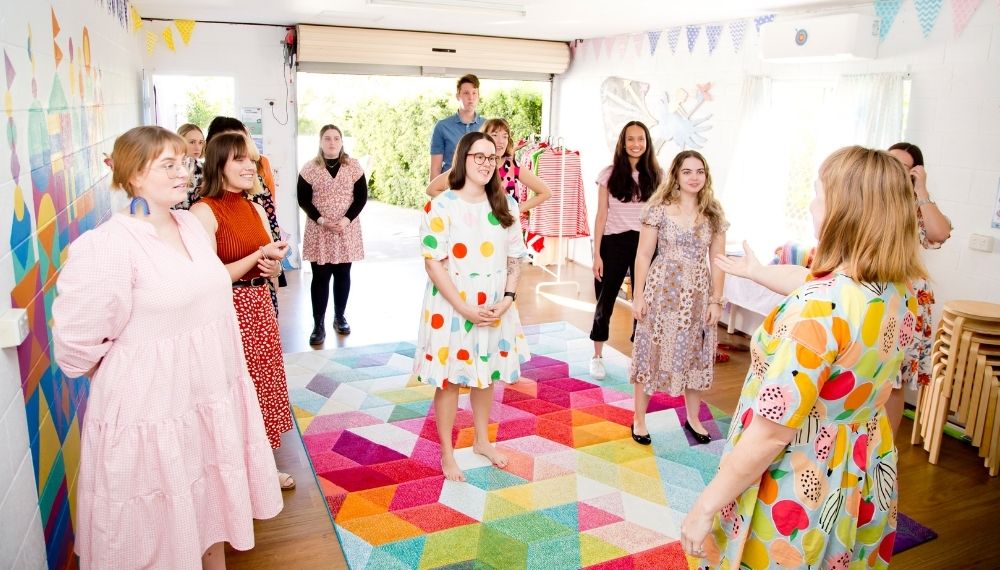
10 Jun Tips for prioritising progress over perfection
If we focus on being perfect all the time, we hear that little voice in our head that says, “not good enough.” When I listen to the voice, I buy into what it’s telling me, and end up jumping down the rabbit hole of blame. Blame leads to resentment. Resentment leads to loathing.
Here are some things that I do to focus on progress not perfection. The following are tools I apply to almost any situation – from my work, to my relationships, to my teaching.
Stop being so dramatic
When my perfectionist brain is in the driver’s seat, I am more inclined to be negative than positive. I remember pulling off a perfect open day a few years ago – a perfectly structured, beautifully organised, and well-attended event, where we enrolled about 20 new students. Despite the glaring success, I remember writing the whole day off as a failure because I forgot to organise bubbles for the staff to share at the end of the day. My silly little brain just would not let it go. My advice? Chill. Stop being so dramatic and focus on the good bits.
Ask:
Is this really a big deal?
Was it as bad as you think?
Did anyone actually notice?
I’ve found the reflection tool “same/more/less” quite helpful, as it encourages me to look at what went well, what I would keep the same and what I could do differently.
I used this tool to evaluate how I went on a recent training day, and discovered that there were far more successes than failures, and that the “failures” were really just hiccups that nobody else noticed.

Connect with your values
Living a values-led life (and running a values-led business) is so incredibly important to me.
My latest list of values are: independence, calmness, fun, growth, and integrity.
Knowing my values helps me identify why something doesn’t feel right, so I can change direction or change my approach. Prioritising my values also helps me find the will to do certain things, even when I don’t feel like doing them.
My values help me:
- Get up on cold mornings because I know a good morning means a calm day
- Let go of small failures, learn from my mistakes, and focus on growth.
- See projects through to the end, even when I’m tired because (for me) commitment is linked to integrity
If you’re wanting to do some work on uncovering your values, my advice would be to connect with a psychologist, or you can try following a values elicitation process like this one.
Try again
There’s always another chance to do it better.
I yelled at my class, and I wish I hadn’t.
I priced my program too low, and now I have to put up the price.
I hired the wrong person, and now I have to fire them.
These are all self inflicted situations, that I could have avoided but didn’t.
We’ve all heard the story about Thomas Edison, who famously said, “I haven’t failed. I’ve just found 10,000 ways that won’t work.” Eddison had plenty of thoughts on hard work and persistence. And the good thing about perfectionists is that we’re incredibly hard workers.
When I mess something up these days, I ask:
How does this moment fit into the larger story?
What lessons have I learned that will help me next time?
What will I do differently?
Show empathy – to others, to yourself
There’s a myth that running an empathy-led business will result in slack employees who don’t do any work. That treating people with gentleness will cause a lack of productivity, even laziness. Well, in my opinion, that’s rubbish. My team performs at an incredibly high level but they don’t have to be overworked or berated to get there. They need three things:
- To be cared for
- To know what’s expected
- To be recognised for their work
When they stuff up (and they will stuff up, because, human) they need to be made aware, but not in a way that shames, blames or otherwise belittles them.
Being empathetic doesn’t mean being soft. It doesn’t mean letting employees get away with poor performance, it just means digging a little deeper to try and uncover what’s really going on.
And learning this about people management actually taught me to be kinder to myself as well.
I care for myself. I speak kindly to myself.
I try to have realistic expectations.
And I recognise when I am going well.
When I stuff up, I try to avoid shaming myself or beating myself up.
I wouldn’t do it to my staff, so why do it to myself?
Set a goal
There’s nothing like a good old goal to get me to focus on the future. When something goes wrong, I go back to my goal and start asking questions.
Is this goal still relevant?
Has the goal changed?
Does the goal need to change?
What are the steps that will get me there?

A great example of working using goals was during 2020’s lockdown. I decided my goal was to make it through the year with relationships intact. We gave refunds, handed out scholarships, and tried not to take any of the cancellations to heart.
A new program called Drama Club had been brewing in my mind for some time, and the lockdown was the perfect time to develop it, ready to launch when things resumed in term three.
Goals are there to guide me. It doesn’t matter if my goals change. What matters is that I’m always thinking about them, writing them down, and using them to challenge myself.
Read more about how we learn and grow from our failures at Speak Up here.

